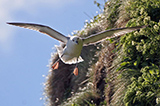séminaire du pôle évolution du vivant – vendredi 1er décembre 2017
 How does environmental variability affect foraging behaviour and life history traits in Southern Ocean seabirds?
How does environmental variability affect foraging behaviour and life history traits in Southern Ocean seabirds?
Nina Dehnhard, université d’Antwerp, Belgique
vendredi 1er décembre 2017, à 11 heures, amphithéâtre Monge
Global climate change is predicted to – along with many other effects – cause increasing air and ocean temperatures, changes in wind patterns and a decline of sea ice in the polar ecosystems. The ability to cope with environmental variability will be crucial for organisms to adapt and survive these changes. Seabirds are long-lived, slowly reproducing animals and therefore have a slow evolutionary adaptation rate. They already now form one of the most-threatened taxonomic groups of birds in the world and climate change might present a large challenge to some seabird species. In the first part of my presentation, I will present data on how environmental variability affects the diet, space use and foraging success of southern rockhopper penguins (Eudyptes chrysocome chrysocome). I furthermore investigated if and how the timing of breeding, investment into breeding and parental body mass differ with annual variation in climate indices in this species and whether individuals differed in their responses. In the second part of my presentation, I will show work in progress about the foraging behaviour and diet of three species of Antarctic fulmarine petrels (Antarctic petrel Thalassoica antarctica, Cape petrel Daption capense and Southern fulmar Fulmarus glacialoides), and the environmental conditions that shape foraging areas of these sea-ice adapted species.
- extrait:
- lien_externe:
- kc_data:
- a:8:{i:0;s:0:"";s:4:"mode";s:0:"";s:3:"css";s:0:"";s:9:"max_width";s:0:"";s:7:"classes";s:0:"";s:9:"thumbnail";s:0:"";s:9:"collapsed";s:0:"";s:9:"optimized";s:0:"";}
- kc_raw_content:
 How does environmental variability affect foraging behaviour and life history traits in Southern Ocean seabirds?
How does environmental variability affect foraging behaviour and life history traits in Southern Ocean seabirds?Nina Dehnhard, université d'Antwerp, Belgique
vendredi 1er décembre 2017, à 11 heures, amphithéâtre Monge
Global climate change is predicted to – along with many other effects – cause increasing air and ocean temperatures, changes in wind patterns and a decline of sea ice in the polar ecosystems. The ability to cope with environmental variability will be crucial for organisms to adapt and survive these changes. Seabirds are long-lived, slowly reproducing animals and therefore have a slow evolutionary adaptation rate. They already now form one of the most-threatened taxonomic groups of birds in the world and climate change might present a large challenge to some seabird species. In the first part of my presentation, I will present data on how environmental variability affects the diet, space use and foraging success of southern rockhopper penguins (Eudyptes chrysocome chrysocome). I furthermore investigated if and how the timing of breeding, investment into breeding and parental body mass differ with annual variation in climate indices in this species and whether individuals differed in their responses. In the second part of my presentation, I will show work in progress about the foraging behaviour and diet of three species of Antarctic fulmarine petrels (Antarctic petrel Thalassoica antarctica, Cape petrel Daption capense and Southern fulmar Fulmarus glacialoides), and the environmental conditions that shape foraging areas of these sea-ice adapted species.
- titre:
- How does environmental variability affect foraging behaviour and life history traits in Southern Ocean seabirds?
- intervenant:
- Nina Dehnhard
- date:
- vendredi 1er décembre 2017
